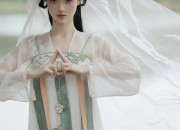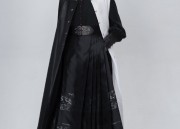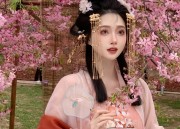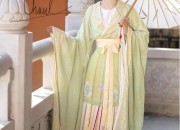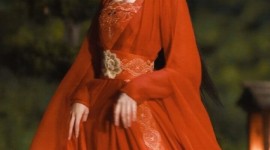The Role of the Hanfu Ceremony Officiant:Preserving Traditional Splendor Through Rituals
In the vibrant tapestry of Chinese culture, Hanfu, also known as Traditional Chinese clothing, stands as a testament to the rich history and exquisite craftsmanship of the nation. As a pivotal aspect of this heritage, the role of the Hanfu ceremony officiant is pivotal in ensuring that these traditions are passed down through generations.

The art of Hanfu ceremonies dates back to thousands of years, embodying a profound respect for ancestors and cultural values. The officiant, dressed in his own splendid Hanfu attire, acts as a bridge between the ancient past and the present, carrying forward the essence of these rituals. His knowledge of Hanfu history, culture, and traditions is vast, as he interprets them through the lens of a ceremony.
The responsibilities of a Hanfu ceremony officiant are diverse and demand a high level of dedication and expertise. He must meticulously plan and execute various rituals, from wedding ceremonies to festivals and other cultural events. His job involves coordinating with families to understand their needs and desires, ensuring that each ceremony is tailored to reflect the family's unique cultural heritage. The officiant must present himself with dignity and grace, embodying the essence of Hanfu culture through his words and actions.
The role also involves an intricate understanding of Hanfu attire and its various styles and designs. As he donns the robe or robe-like attire of a traditional Chinese scholar or noble, he must understand the symbolism and significance behind each piece. From the intricate patterns to the color combinations, everything holds a deeper cultural significance that needs to be respected and adhered to during the ceremony.
Moreover, as a Hanfu ceremony officiant, he acts as a cultural ambassador, educating guests and participants about the rich history and traditions associated with Hanfu culture. His knowledge is vast, spanning centuries of history, folklore, and traditions that he shares with enthusiasm and dedication. He ensures that each ceremony is not just a mere formality but an occasion for participants to delve deeper into their cultural roots and understand their significance in modern times.
Beyond the technicalities of executing rituals, the officiant must possess a profound sense of empathy and understanding. He must be able to connect with people on a deeper emotional level, ensuring that the ceremony is not just about following traditions but about creating an emotional experience for everyone involved. His ability to captivate an audience's attention and convey the essence of Hanfu culture through his words is invaluable.
In conclusion, the role of the Hanfu ceremony officiant is more than just about executing rituals; it's about preserving a rich cultural heritage and ensuring that these traditions are passed down through generations. He stands as a testament to the beauty and richness of Hanfu culture, embodying its essence through his words, actions, and knowledge. His dedication and passion ensure that each ceremony is an occasion for celebration, education, and connection with one's cultural roots.
In today's world, where globalization has led to a melting pot of cultures, the role of the Hanfu ceremony officiant becomes even more crucial. He stands as a guardian of this rich cultural heritage, ensuring that Hanfu culture remains alive and thriving in modern times.


